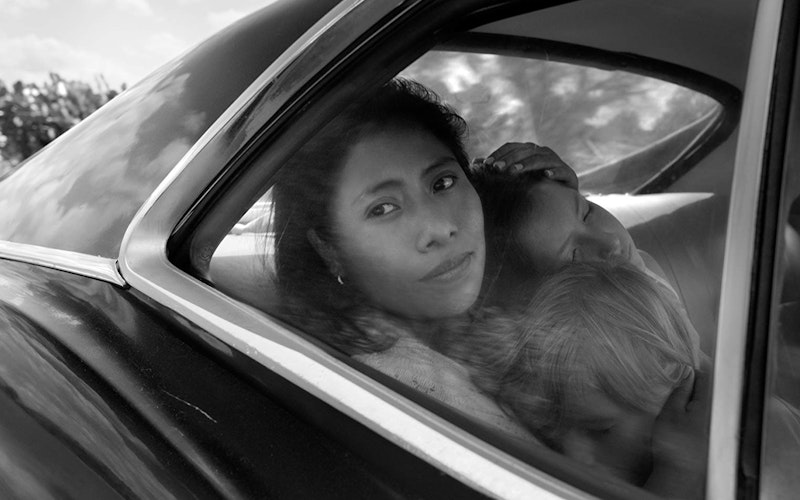
Movies
Roma’s Long Obedience
It’s a rare sound: a roomful of jaded film critics trying to hold their weeping sniffles inside. That’s what happened during the New York Film Festival screening of Roma, writer-director Alfonso Cuarón’s gorgeous epic about his childhood in Mexico City. It’s not a tragic film, but it’s so poignant and full of everyday tragedies and joys that at the end the viewer is wrung dry.
Roma may sound like an exercise in hyper-emotional nostalgia, but Cuarón crafted it as a universal story. At the screening in New York, an Italian woman commented on how the film reminded her of her childhood, and Cuarón said he has heard that from a viewer from Bombay too. He described the film as a comment on our existence, which is “a shared experience of loneliness,” transient and with elements that are “completely out of our control.”
Though Roma is dealing with big topics, it is mainly a portrait of the woman who was the rock of Cuarón’s faltering family in the early 1970s: the family servant. In real life her name is Liboria Rodriguez (or “Libo”) and she has appeared with Cuarón at festivals and promotional events for the film. But in this story her name is Cleo, played with devastating humility and grace by Yalitza Aparicio, who learned an indigenous language for the Spanish-language film and who deserves any award Hollywood can give.
The character of Cleo reminded me of Eugene Peterson’s description of discipleship as long obedience in the same direction. The phrase actually originates with Friedrich Nietzsche, who wrote, “The essential thing in ‘heaven and earth’ is … that there should be a long obedience in the same direction, [that] thereby results, and has always resulted in the long run, something which has made life worth living.” Peterson applied Nietzsche's phrase to our "instant society,” where he encouraged daily faithfulness by way of habits like reading the Psalms. "There is a great market for religious experience in our world,” Peterson wrote, “there is little enthusiasm for the patient acquisition of virtue, little inclination to sign up for a long apprenticeship in what earlier generations of Christians called holiness.”
Cuarón did not make an explicitly Christian film (there’s a Buddha statue in the family home, while the grandmother offers Catholic prayers), but Roma nonetheless evidences the gospel’s upside-down themes. The movie brings life out of death, strength out of weakness, and beauty out of unremarkable obedience.
As the story unfolds, both the family household and Mexico City as a whole are tumultuous around Cleo. The family has inner heartbreak, while political violence erupts outside. Meanwhile, poverty constantly threatens Cleo’s class of indigenous workers. Yet Cleo, whose own love life has its dramatic twists and turns, remains steady as a drip from a faucet.
Roma brings life out of death, strength out of weakness, and beauty out of unremarkable obedience.
In one scene, after the family has gone to sleep, the camera follows Cleo as she goes through the house turning out the lights. This is not her house, this is not her family, but she (rather, notably, than the often-absent father) is there protecting and checking everything. And in the morning, she’s the one cheerfully waking up the children. Cuarón holds up that daily steadfastness as one of the most beautiful things in the world.
Another scene slyly paints her heroism. Professor Zovek (a real escape artist in 1970s Mexico, here played by professional wrestler Victor Manuel Resendiz Ruis) is training a group of muscular young men learning martial arts, while Cleo and a handful of other spectators watch them. Zovek lifts his leg to rest on his other leg and then touches his fingertips over his head. What’s so hard about that? The men laugh. This is the great Zovek? But then he closes his eyes. When these would-be warriors try to do the same, they stumble and fall. (I tried it myself and failed.) Meanwhile, in the background, unnoticed, Cleo holds the pose effortlessly, a quietly comic reminder that God chooses the weak things of the world to shame the strong.
In that pose, Cleo also further evidences her steadfastness, a quality that those around her either fail to notice or take for granted. But God notices it and values it. In fact, Roma alludes to a higher heavenly power watching and cherishing Cleo's outwardly unremarkable life. The first shot is of the sky reflected in a puddle of water, as Cleo washes the driveway of the family’s home. The audience looks at the sudsy sky-puddle for several minutes, only later learning that she must regularly wash this area because it’s where the family dog poops. It’s a gross daily moment, but Cuarón treats it as beautiful and worthwhile.
Then, in the last shot of the film, the camera turns from the dirty floor upward, to the sky (Nietzsche’s “heaven and earth”). We watch Cleo climb a staircase on her way to another menial task. At the top, she disappears onto the roof, having ascended into the heavens. We’ve seen no evidence of a life of wealth or fame or power. But heaven has noticed and cherished her steadfastness—her turning out of lights and her scrubbing of clothes and her embrace of hurting, lost children who are not her own.
Topics: Movies